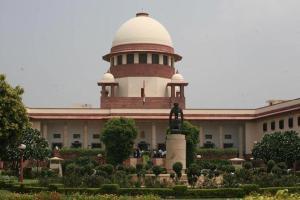The hearings through video conferencing facilities have seen "approximately 65,000 footfall of advocates, litigants and journalists" in the apex courts premises

The Supreme Court, which faced "unprecedented" challenge of COVID-19 pandemic crippling its physical hearings, set up 1,021 benches in last 100 days to deal with over 15,000 matters argued or represented by 50,475 advocates through video conferencing mode, an official statement said.
ADVERTISEMENT
The top court, which has been hearing matters through video conferencing since March 23, two days before the national lockdown was imposed to restrict the spread of coronavirus, has finally decided as many as 4,300 cases, it said.
It said that despite the fact that about 125 number of "Registry staff and their immediate family members also got infected with the virus", the apex court's registry has been functioning with a reduced number of staffers due to various reasons including lack of adequate public transport facilities.
"In all of this (COVID cases among registry officials), the Supreme Court of India did not stop functioning throughout this entire period though some preferences were accorded to urgent issues. The Registry has not been shut down even for a day from March 16, 2020 till date," it said.
"The functioning of the Supreme Court faced unprecedented challenges with the onset of COVID-19 pandemic. COVID-19 infection arrived with the suddenness of an ambush and the ferocity of a fire as it spread across the human communities across the globe," it said.
"It distinguished itself with deviant behavior, unpredictable symptoms, total camouflage inside the body of the host and infectious capability through the human body and through aerosols. The rapid pace of spreading of the virus triggered national lockdown, institutional quarantines and such other aggressive measures, aimed at breaking the chain of the spreading virus," it said.
Giving the account of voluminous judicial work done between March 23 to August 20, it said that in such a backdrop of a huge challenge in the form of the virus, "the Supreme Court of India had to respond with greater speed to keep its functionality unbroken and unaffected even during the national lockdown."
It said that 1,021 SC benches dealt with 15,596 matters which included 587 main matters and 434 review petitions during the last 100 days and approximately 4,300 cases have been disposed of.
The hearings through video conferencing facilities have seen "approximately 65,000 footfall of advocates, litigants and journalists" in the apex court's premises, it said. It also referred to the details of cases heard and decided by the Supreme Court of the United Kingdom the USA and the top court of the European Union.
It said that the UK's top court, which is presently in recess, decided 29 cases between March 24 to August 17. The top court of the USA heard 74 cases between March 30 to August 17 and decided 44 of them, it said, adding that the top court of the European Union decided 57 cases between March 16 to August 17.
"To facilitate the lawyers and litigants, who may face difficulty in joining the video conferencing, 12 facilitation rooms have been created, out of which 5 facilitation rooms are functional from Additional Building Complex of the Supreme Court of India and 7 VC facilitation rooms are functional, one each from the District Court Complex of Delhi. Technical VC assistance is provided in these VC facilitation rooms," it said.
Keep scrolling to read more news
Catch up on all the latest Crime, National, International and Hatke news here. Also download the new mid-day Android and iOS apps to get latest updates.
Mid-Day is now on Telegram. Click here to join our channel (@middayinfomedialtd) and stay updated with the latest news
This story has been sourced from a third party syndicated feed, agencies. Mid-day accepts no responsibility or liability for its dependability, trustworthiness, reliability and data of the text. Mid-day management/mid-day.com reserves the sole right to alter, delete or remove (without notice) the content in its absolute discretion for any reason whatsoever
 Subscribe today by clicking the link and stay updated with the latest news!" Click here!
Subscribe today by clicking the link and stay updated with the latest news!" Click here!






